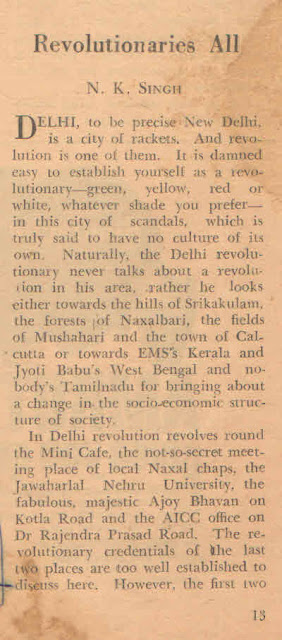 |
| Tapan Sinha's Sagina Mahato (1970) was a brilliant spoof on working class movement. It convincingly proved how revolution devours its own children. |
NK SINGH
Delhi, to be precise New Delhi, is a city of rackets. And revolution is one of them. It is damned easy to establish yourself as a revolutionary--green, yellow, red white, whatever shade you prefer in this city of scandals, which is truly said to have no culture of its own.
Naturally, the Delhi revolutionary never talks about a revolution in his area, rather he looks either towards the hills of Srikakulam, the forests of Naxalbari, the fields of Mushahari and the town of Calcutta or towards EMS's Kerala and Jyoti Babu's West Bengal and nobody's Tamilnadu for bringing about a change in the socio-economic structure of society.
In Delhi revolution revolves around the Mini Cafe, the not-so-secret meeting place of local Naxal chaps, the Jawaharlal Nehru University, the fabulous, majestic Ajoy Bhavan on Kotla Road and the AICC office on Dr Rajendra Prasad Road.
The revolutionary credentials of the last two places are too well-established to discuss here. However, the first two places may provide a clear insight into the state of affairs prevailing in the capital city of India.
To confess, though this correspondent had heard much about the 'Coffee House' revolutionaries, he had never had the honour to come across this species. Thanks to Delhi and its Mini Cafe he had had his fill. Almost all the revolutionaries who attend Mini Cafe discourses on Marx, Lenin, Mao and Charu -- of late Bhagat Singh has infiltrated in between -- are Hindiwallahs, serving the mouth organs of this or that political party or working as a freelancer for some 'bourgeois' journal.
In the daytime, they are busy writing a leader on the democratic bonafide of Mrs Gandhi's Government and in the evening they speak at length at a meeting organised to mourn Charu Mazumdar's death. The skill with which they manage to perform both tasks at the same time is a matter of appreciation for all the circus fans.
But perhaps the best thing about the Mini Cafe is that it is just one floor below the Coffee House. So, a few steps upwards and you are amidst the well-dressed bourgeois gentlemen and a few steps downwards and you are back to your good old Mini Cafe. Perhaps this is what they call having the best of both worlds.
There is yet another variety of revolutionaries. They do not like being called coffee house revolutionaries. Neither do they attach themselves to the scholarly social-scientists-cum-revolutionaries. This in-between variety remains 'underground' the whole week, comes out on Wednesday evening, buys a copy of Frontier and vanishes. Nobody has reported them wearing masks, though.
However, the most amusing but more sincere-looking brand of revolution is provided by the academic institutions of Delhi. Jawaharlal Nehru University is one of them. Another is the Indian School of Social Sciences which has started a monthly journal, Social Scientist, by spending just a paltry sum of 3,000 rupees.
All these people want to facilitate the path of revolution through their academic research and scientific analyses. They are particularly very fond of the term 'scientific' and use it as a prefix or suffix whenever possible. These scholars think that their task is to provide a theoretical basis for the revolution. And they go on writing volumes for it.
Division of work, say economics textbooks, is the scientific way to boost production. So one group makes research, another does the reporting, yet another reads... and there is of course one more group which works, fights and dies. Fools!
Frontier
16 September, 1972




Comments
Post a Comment
Thanks for your comment. It will be published shortly by the Editor.